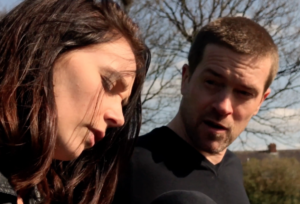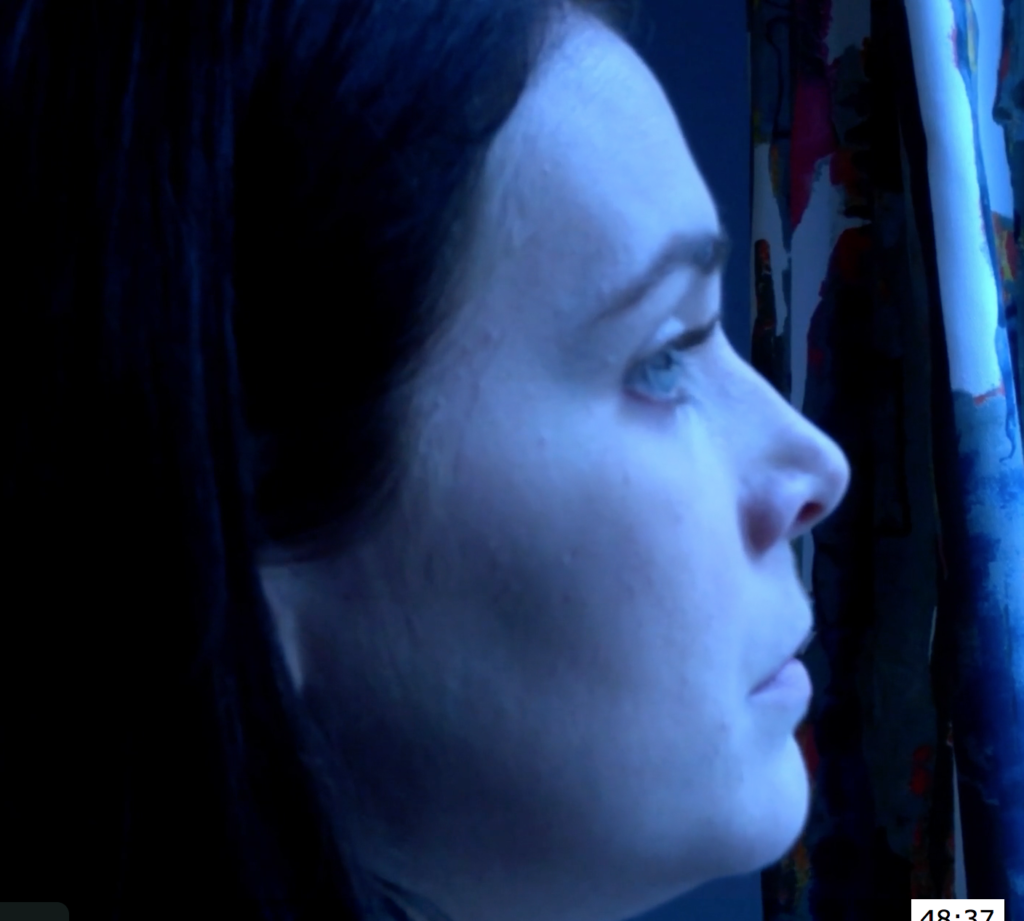Filmmaker Elliot Maguire accepts a lofty challenge with “The Ferryman” – to produce a full-length independent feature filmed exclusively on an iPhone 7. It’s an interesting concept, one that allows Maguire to prove the ever-increasing mediums available to filmmakers who want to be creative. The film, about a woman who begins having visions after a failed suicide attempt, isn’t ambitious, and keeps its sequences spread between dark loft apartments and hospitals. The film celebrates what can be accomplished with a smartphone camera, and, for Maguire’s debut, offers intriguing shots that stay focused and never pull you out of the world he’s created. But the film’s progression – which jumps in and out of reality – skips over a lot of exposition in favor of style, making it frequently hard to follow.
The film starts eerily, and Maguire does a good job using visuals to paint a picture. We see a woman, Mara (Nicole Holt) first lying in bed, then sitting in her living room, then rewatching old home movies of her and her mom. It’s effective. We know this woman has lost someone important and is struggling with depression. It’s no surprise when she does attempt suicide, and the ensuing scene in her bathtub is disturbing while never becoming tasteless. Low-droning bass and a somber piano further the proceedings, courtesy of sound recordist Daniel Langham. However the film doesn’t end there. In a twist, Mara’s absentee father saves her life by donating blood and remains at her bedside as she awakens in a hospital.
The nicest thing about “The Ferryman” is that the film doesn’t insult your intelligence, and you can tell the time and effort Maguire put into crafting his characters and settings. The photography is dark and grim when dealing with Mara’s apartment and its city scenes (filmed in and around Manchester, UK), and bright and crisp during daylight and indoor shots. Here Maguire has smartly ignored the overabundance on gore many indies rely on, preferring instead to focus on his main character’s psychology.

Maguire’s also done a good job casting Holt and Garth Maunders, who plays her father, as both seem to be capable actors who work well with the material. They each have their scenes – Maunders, as he recounts Mara’s late mother at a dinner table conversation that has depth and feeling; Holt as she breaks down near the film’s end, slumped against a door, with tears that feel both painful and real.
There’s a few other players, such as a nurse, played by Pamela Ashton, and a police detective, played by Azz Mohammed, who do well with their characters. No one sticks out here as trying to act, and the dialogue flows with relative ease.
Problems present themselves with the script and sound, which seem to take away from the film in places where it needed help the most. The sound is the biggest culprit, and betrays the limited capabilities of the iPhone’s microphone. Dialogue between key characters is difficult to hear; this is especially true during one heart-to-heart between Holt and Maunders, and another scene that takes place in a therapy group Mara attends after her discharge. I found myself straining to hear; and you get the impression the dialogue is important to the film in ways that are difficult to make up.
There’s also the film’s skip and jerk pace, which attempts to insert Mara into one confusing scene after another as she is stalked by the mysterious Ferryman (Phillip Scott-Shurety). The Ferryman is also victim to the film’s biggest oversight – a lack of introduction. There’s one scene of Mara reading aloud the myth of the Ferryman from Greek mythology (who collects coins from the dead to transport them to the afterlife), but we’re not really privy to any reason as to why the Ferryman is indeed after her.
 There’s an obvious reason, of course, that is tepidly explored in a scene as Mara hands the Ferryman two coins in a darkened room; however the film glosses over this and speeds towards its bizarre conclusion. Is Mara alive? Did she die that night in the bathtub? We’re not to find out. The film blurs this further with its surface-level only relationship between Mara and her father, as well as character development that stops just when it gets intriguing.
There’s an obvious reason, of course, that is tepidly explored in a scene as Mara hands the Ferryman two coins in a darkened room; however the film glosses over this and speeds towards its bizarre conclusion. Is Mara alive? Did she die that night in the bathtub? We’re not to find out. The film blurs this further with its surface-level only relationship between Mara and her father, as well as character development that stops just when it gets intriguing.
“The Ferryman” isn’t a bad film. It tries. Maguire has created an interesting project with taut, smart camerawork and a low key and somber soundtrack – all the more impressive given his scant budget of £1,500. The dark visuals pull you into the production, and the film’s focus never wanes. However, an absence of scares, as well as its dreamlike progression fail to make its more intense moments stick. Maguire’s debut is visual and atmospheric – even if it never reaches the levels of psychological horror it intends.
– by Mark Ziobro


